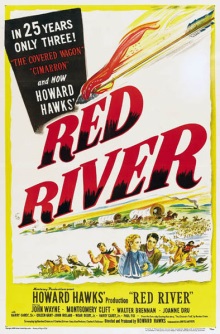
This film made it into my “to watch” list based on a recommendation from a Broken Forum regular. Director Howard Hawks had an incredible decade in the 1940s, with the poster calling His Girl Friday one of best English-language comedies ever made, The Big Sleep inarguably the best film noir ever and Red River the best traditional western.
Red River appears to have some historical basis as a fictionalized account of the first cattle drive along the Chisholm Trail in which ranchers from Texas would bring their herds to Kansas so they could be sold and transported by rail-road to the east. In the film, this involves driving nearly 10,000 heads of cattle on a journey that takes over three months across hostile land, a formidable endeavour.
But the real focus of the film is on the relationship and contest of wills between stubborn rancher Thomas Dunson (played by John Wayne) and his adopted son Matthew Garth (played by Montgomery Clift). Intriguingly, there is no antagonist in the traditional sense. The challenge to be overcome is the dangers of the journey itself, including Indian attacks, and Garth’s struggle to grow beyond Dunson’s shadow.
My favourite thing here is how Wayne plays Dunson as a complete bastard. The so-called American pioneers of course travelled west of grab land, mostly from Native Americans but also from Mexicans, and they held on to that land through pure strength of arms. Hawks portrays this in a refreshingly straightforward manner. Dunson is unapologetic about this and about being the lord and master of everything on his lands, including his men. At the same time he holds to the traditional Western gunslinger’s code of honour: give everyone a fair fight to see who is the fastest draw and the most accurate shot.
My least favourite parts are how shallowly the women are written. I get that this was a misogynistic time but I still find it hard to believe that women would behave in such a passive and needy way. I also disliked how casually the Native Americans are treated as just another obstacle to be dealt with. But the worst part is the sudden change in tone as the film draws to its end. Throughout the film, we’re shown how tough times are and how men makes their own laws in the wilderness, but then suddenly it’s all sunshine and rainbows.
I didn’t get as much out of this film as I thought I might, probably because this film might have special emotional resonance for some Americans due to its historicity but this doesn’t apply to me at all. Still, the actors turn in fine performances, the action is convincing and the sight of all those thousands of cattle is impressive indeed. I suspect that they might not have been as concerned about harming animals in the course of making a movie as Hollywood is today. Surprisingly even the humour, especially the antics of Groot and his teeth, is effective without being pandering and ridiculous.
Overall, I found this to an eminently entertaining and watchable film even if it isn’t quite the classic I expected it to be. One thing is for sure, this is a western about real cowboys and what they do, i.e. ranchers who raise herds of cattle, as opposed to professional gunslingers who shoot up everything in sight. That in of itself is something of a novelty.